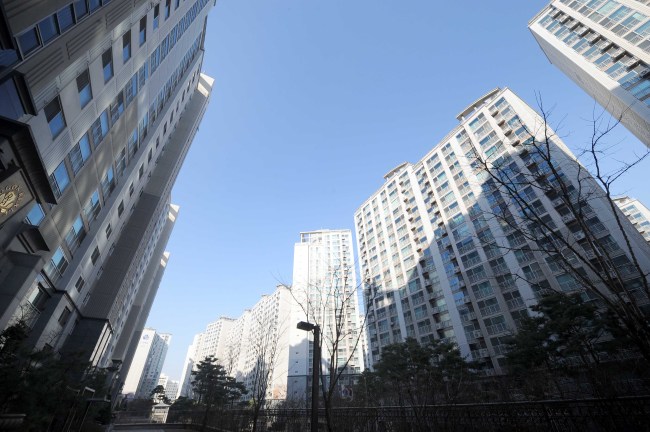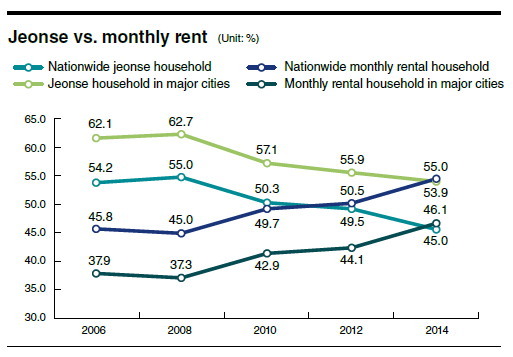Owning a house or an apartment used to be a symbol of not only wealth, but also pride and security for an average salaried worker.
A couple of decades ago, to buy and live in a dream house of four bedrooms, two bathrooms and a veranda, an ordinary income earner was able to come up with the money in five to seven years.
South Korea’s unique real estate financing system called jeonse made this possible especially in the double-digit interest rate era until the 1997 Asian Financial Crisis.

Jeonse leases, in which tenants pay a lump-sum deposit ― typically between a quarter and half of the property’s value ― to landlords for two years, allowed the middle class to buy extra time to save money and self-finance the purchase of their dream house in the old days, with very little borrowing.
It also provided an opportunity for landlords to accumulate wealth with the deposit ― to be immediately returned after the apartment contract expires ― as they were able to gain hefty returns by simply parking that money in the bank, with double-digit interest rates.
Introduced in the 1950s to boost the livelihoods of the middle class, the jeonse system was a “win-win method” for both those seeking to buy a house in the near future and those who already owned and leased a house.
But now things have changed.
The unique system no longer seems to be win-win, as Asia’s fourth-largest economy has matured with little headway in finding new growth under increasing uncertainty and risk.
Banks’ deposit interest rates, which once reached double-digit highs in the 1980s amid the economic expansion, hover in the low single digits, benchmarking the central bank’s key base rate of 2 percent.
Facing aging population and early retirement, homeowners are finding it less attractive to lease their apartments in the form of jeonse and are turning to monthly rents, as they seek stable returns on their housing investment.
Various deregulatory policies have been introduced to maintain stable and affordable housing supplies especially for the low and middle class, but to no avail.
Homeowners are not able to gain much financial leverage from jeonse leases as they are no longer assured of significant house price increases like in the old days during the real estate boom.
“I think today’s problems clearly indicate that buying a house will no longer provide the same opportunity as we had observed over the last 20 years ― an opportunity most Korean dreamt of building wealth,” said professor Jin Chang-ha, an economist specializing in real estate finance and investment at Hanyang University.
With a very limited supply of jeonse apartments and low bank deposit rates, prospective homebuyers now either have to take out a mortgage to buy a house or live in a monthly rental apartment. Or, ask their parents for help to partially finance their jeonse leases, rents or purchase ― common especially among the young newlyweds.
Living in monthly rental apartments has become more common now than living in jeonse homes, like in most western countries, as slow wage growth ― pretty much the same as the country’s inflation rate of around 1 percent ― makes it harder for mid-to-low income earners to accumulate wealth and come up with the money for high jeonse apartment prices ― now about 80 percent of home market value.
“We expect the number of jeonse homes to further decrease beyond Seoul and the metropolitan areas amid the changing market landscape,” said a KB Bank real-estate researcher.

The Land Ministry said that monthly renters accounted for 55 percent of tenants in the country last year, the highest since the government began its survey in 2006.
The rate increased from 50 percent two years ago, and overtook households living in jeonse apartments, which accounted for 45 percent of the total last year, down from 49 percent in 2012.
This is attributable to the changing perceptions toward houses, as consumers no longer view them as an investment or short-term asset.
About 79 percent of 20,000 households surveyed by the ministry said they intend to buy a house, down from 84 percent in 2010. Those aged less than 34 showed the lowest interest in purchasing a house.
The housing statistics indicate that a paradigm shift has occurred in the real estate market with the people’s perception and priority changing. Koreans no longer want to own homes for wealth and pride, but more for stability and comfort as the nation faces a socioeconomic transition.
By Park Hyong-ki (
hkp@heraldcorp.com)






![[Exclusive] Hyundai Mobis eyes closer ties with BYD](http://res.heraldm.com/phpwas/restmb_idxmake.php?idx=644&simg=/content/image/2024/11/25/20241125050044_0.jpg)
![[Herald Review] 'Gangnam B-Side' combines social realism with masterful suspense, performance](http://res.heraldm.com/phpwas/restmb_idxmake.php?idx=644&simg=/content/image/2024/11/25/20241125050072_0.jpg)

